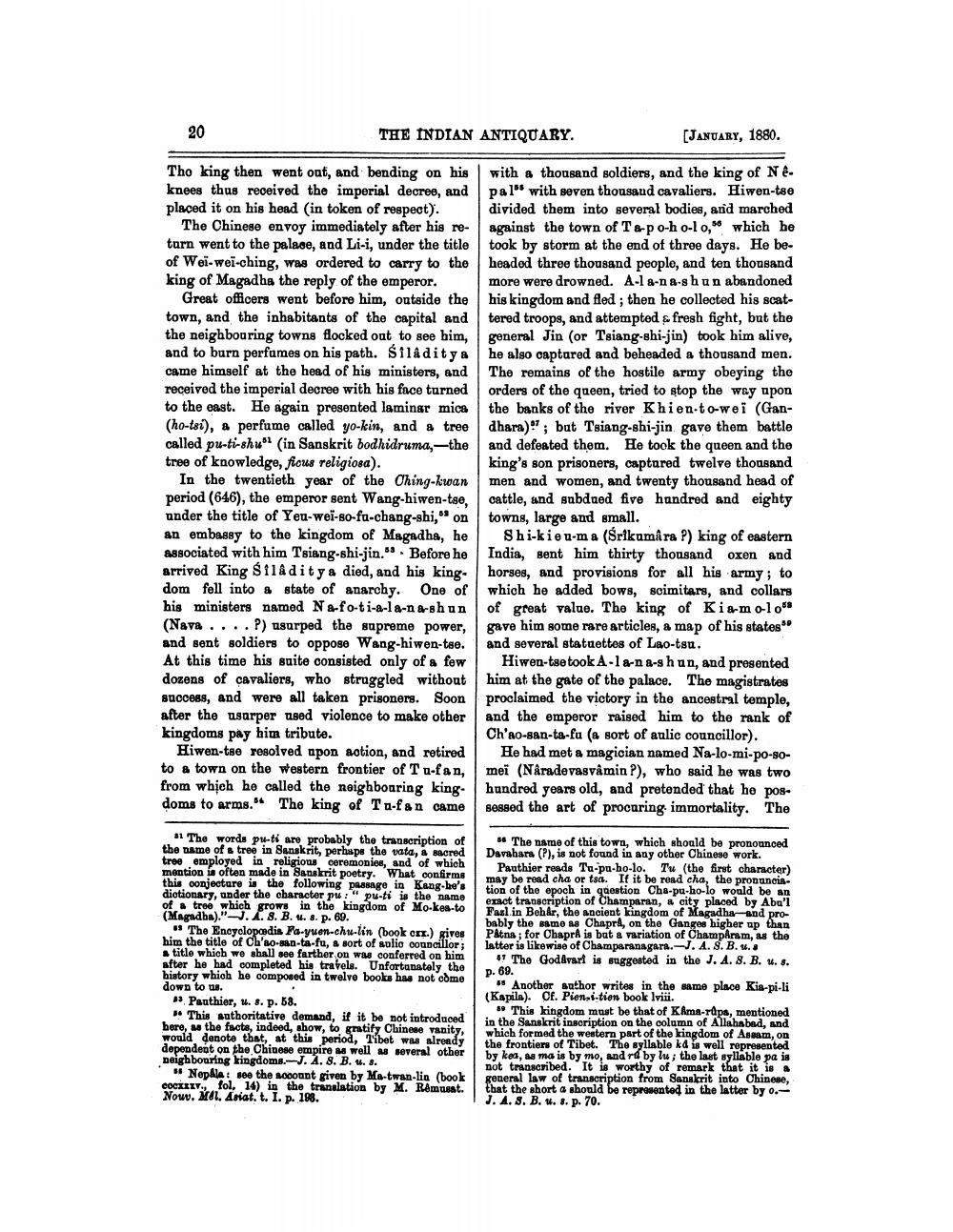________________
20
THE INDIAN ANTIQUARY.
(JANUARY, 1880.
Tho king then went out, and bending on his knees thus received the imperial decres, and placed it on his head (in token of respect).
The Chinese envoy immediately after his re- turn went to the palace, and Li-i, under the title of Wei-weï-ching, was ordered to carry to the king of Magadha the reply of the emperor.
Great officers went before him, outside the town, and the inhabitants of the capital and the neighbouring towns flocked out to see him, and to burn perfames on his path. Siladitya came himself at the head of his ministers, and received the imperial decree with his face turned to the east. He again presented laminar mica (ho-tsi), a perfume called yo-kin, and a tree called pu-ti-shut (in Sanskrit bodhidruma,-the tree of knowledge, fious religiosa).
In the twentieth year of the Ching-kwan period (646), the emperor sent Wang-hiwen-tse, under the title of Yeu-wei-so-fu-chang-shi," on an embassy to the kingdom of Magadha, he associated with him Tsiang-shi-jin." . Before he arrived King $11&ditya died, and his king dom fell into a state of anarchy. One of his ministers named Na-fo-ti-a-la-na-shun (Nava ....Pusurped the supreme power, and sent soldiers to oppose Wang-hiwen-tee. At this time his suite consisted only of a few dozens of cavaliers, who struggled without SUCCOBS, and were all taken prisoners. Soon after the usarper used violence to make other kingdoms pay him tribute.
Hiwen-tse resolved opon action, and retired to a town on the western frontier of Tu-fan, from whịch he called the neighbouring king doms to arms." The king of Tufan came
with a thousand soldiers, and the king of Nê. pal" with seven thousand cavaliers. Hiwen-tse divided them into several bodies, and marched against the town of T&-po-h 0-10, which he took by storm at the end of three days. He beheaded three thousand people, and ten thousand more were drowned. A-la-na-shan abandoned his kingdom and fled; then he collected his scattered troops, and attempted & fresh fight, but the general Jin (or Tsiang-shi-jin) took him alive, he also captured and beheaded a thousand men. The remains of the hostile army obeying the orders of the queen, tried to stop the way apon the banks of the river Khien-to-wei (Gandhara); but Tsiang-shi-jin gave them battle and defeated them. He took the queen and the king's son prisoners, captured twelve thousand men and women, and twenty thousand head of cattle, and subdued five hundred and eighty towns, large and small.
Shi-kieu-ma (Srikumara P) king of eastern India, sent him thirty thousand oxen and horses, and provisions for all his army; to which he added bows, scimitars, and collars of great value. The king of Kia-mo-10** gave him some rare articles, a map of his states." and several statuettes of Lao-tsu.
Hiwen-tae took A-18-n 8-s hun, and presented him at the gate of the palace. The magistrates proclaimed the victory in the ancestral temple, and the emperor raised him to the rank of Ch'ao-san-ta-fu (a sort of aulic councillor).
He had met a magician named Na-lo-mi-po-somei (Náradevasvâmin ?), who said he was two hundred years old, and pretended that he possessed the art of procuring immortality. The
The name of this town, which should be pronounced Davahara (?), is not found in any other Chinese work.
Pauthier reads Ta-pa-ho-lo. Tu (the first character) may be read cha or tsa. If it be read cha, the pronuncis. tion of the epoch in question Cha-pu-ho-lo would be an exact transcription of Champaran, a city placed by Aba'l Fasl in Behar, the ancient kingdom of Magadha and probably the same na Chopra, on the Ganges higher up than Påtna; for ChaprA is but a variation of ChampAram, as the latter is likewise of Champaranagara.-J.4. 8. B.u..
"The Godavart is suggested in the J. 4. 8. B. u. 8.
* The words pu- are probably the transcription of the name of a treo in Sanskrit, perhape the vata, & sacred tree employed in religious ceremonies, and of which mention often made in Sanskrit poetry. What confirms this oonjecture is the following passage in Kang-be's dictionary, under the character pu " pu-ti is the name of a tree which grows in the kingdom of Mo-kes-to
ingaom or mo-kes-to (Magadba)." 1. 4. 8. B. 4. 3. p. 69.
- The Encyclopaedis Fa-yuen-chu-lin (book orr.) gives him the title of Ch'ao-an-ta-fu, a sort of solio conncillor;
title whiob we shall see farther on was conferred on him after he had completed his travels. Unfortunately the history which he composed in twelve books has not come down to us.
Pauthier, 1. 8. p. 58. * This authoritative demand, if it be not introduced here, the facta, indeed, show, to gratity Chinese vanity, would denote that at this period, Tibet was already dependent on the Chinese empire me well u several other neighbouring kingdoms.-J. 4. 8. B. 4. 3.
"Nopala : 100 the account given by Mo-twan-lia (book COCXLIV. fol, 14) in the translation by M. Rémusst. Now. Mil. Asiat. t. I. p. 188.
p. 69.
* Another author writes in the same place Kis-pi-li (Kapila). Cf. Pien, i-tion book lviii.
69 This kingdom must be that of Kama-rupa, mentioned in the Sanskrit inscription on the column of Allahabad, and which formed the western part of the kingdom of Assam, on the frontiers of Tibet. The syllable kd is well represented by kec, as ma is by mo, and rd by lu; the last syllable pa is not transcribed. It is worthy of remark that it is a general law of transcription from Sanskrit into Chinese, that the short a should be represented in the latter by 0.J.A.S. B. #. . p. 70.
1




